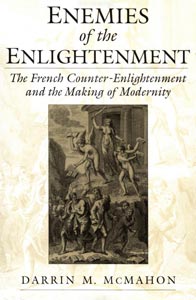
Enemies of the Enlightenment by Darrin M. McMahon, Oxford University Press, London, 2002; ISBN 0195158938, 288 pages, paperback, $21.00.
Today it is fashionable in intellectual circles to criticize the Enlightenment of 18th-century Europe, and call destructive and misguided the ideas of thinkers who risked their lives to espouse freedom of thought, individual conscience, religious toleration, and the separation of dogmatic religion from philosophy, science, and the state. Depending on the source, it is blamed for secularism, materialism, rationalism, totalitarianism, universalism, racism, misogyny, and a host of other modern problems. This thoroughly-researched book describes and analyzes the groups and individuals who opposed the ideas of the Enlightenment, principally at its center in France. In so doing it reveals the causes behind the emergence of the Enlightenment and the activities not only of individual philosophers but of groups such as the Masons. It traces much in the modern world back to the militant conflict between these two factions, showing that the Counter-Enlightenment coexisted with those they opposed from the outset, and that both factions formed each other in large measure.
McMahon focuses on France from the 17th to the early 19th centuries. The counter-forces or Rightists, mainly members of the Catholic Church and aristocratic classes, labeled philosophes such as Voltaire, Rousseau, Diderot, and d'Alembert as English-lovers and Protestant followers, a godless force determined to destroy Christianity, morality, the patriarchal family, monarchy, and culture as it was then known, for the Rightists viewed Catholicism as the only true religion and the basis of the good in Western civilization. The philosophes made plain in conversations and writing that their object was not destruction but the establishment of equality, fraternity, and liberty, words that became the revolutionists' motto. Growing enthusiasm for the new ideas posed a real danger to those who stood to lose power, wealth, status, and control. In reply they warned that equality was impossible because inequality was the pattern of nature, and that such menacing ideas would lead to chaos and disaster. The ascendancy of Enlightenment ideas in France culminated in the Revolution, and the author brings out the extent to which revolutionary violence and extremism resulted from the violent and extreme opposition. Still, the horrifying violence seemed to confirm the prophesies of the Counter-Enlightenment, which rallied and eventually succeeded in bringing Bourbon King Louis XVIII to the throne in 1815 after the fall of Napoleon.
With the reestablishment of the interdependent monarchy and Catholic Church in France, Rightists felt secure that the old order had returned. But their victory was not complete -- time could not be turned back. The king, for example, allowed the publication of the philosophes' writings, including the complete works of their greatest enemy, Voltaire. To dilute such pernicious influences, Rightists issued voluminous writings and burned the philosophers' works in public squares. Still, there were many divisions within the Right itself:
even the seemingly unbreakable Ultra [Rightist] consensus against freedom of expression and religious tolerance proved subject to dispute. Whereas the great majority of Ultras advocated careful control of the written and spoken word, some balked when Louis XVIII attempted to turn the censor against the Ultras themselves . . . , and they came to support, with varying degrees of sincerity, freedom of expression as a necessary means to guarantee the dissemination of their own views. -- p. 191
With the fall of the Bourbon monarchy in 1830, the jockeying of these two forces continued, the word "philosopher" in time replaced with "liberal," though opponents considered the words synonymous. This book will appeal to those wanting a better understanding of the Enlightenment, the forces opposing it, and why conflict over these issues continues today, particularly with the resurgence of orthodox and fundamental religions in the political sphere worldwide. -- Jean B. Crabbendam
(From Sunrise magazine, June/July 2004; copyright © 2004 Theosophical University Press)
World Spiritual Traditions Menu
I remember that in the time of childhood I was very religious: I rose in the night, was punctual in the performance of my devotions, and abstinent. One night I had been sitting in the presence of my father, not having closed my eyes during the whole time, and with the holy Koran in my embrace, whilst numbers around us were asleep. I said to my father, "Not one of these lifteth up his head to perform his genuflexions: but they are all so fast asleep that you would say they are dead." He replied, "Life of your father, it were better if thou also wert asleep than to be searching out the faults of mankind. The boaster sees nothing but himself, having a veil of conceit before his eyes. If he were endowed with an eye capable of discerning God, he would not discover any person weaker than himself." -- Sadi